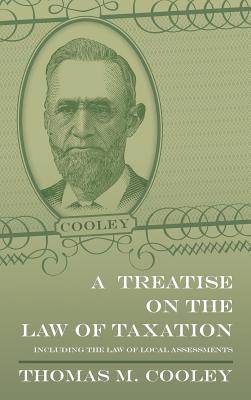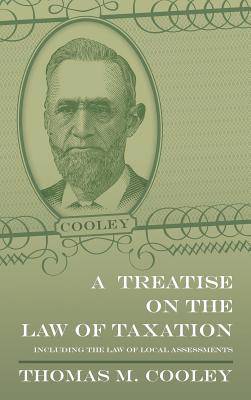
- Retrait gratuit dans votre magasin Club
- 7.000.000 titres dans notre catalogue
- Payer en toute sécurité
- Toujours un magasin près de chez vous
- Retrait gratuit dans votre magasin Club
- 7.000.0000 titres dans notre catalogue
- Payer en toute sécurité
- Toujours un magasin près de chez vous
Description
Reprint of the uncommon first edition. As much a treatise as it is a handbook, which gives this book more than historical value, it examines the nature of taxation and sources of the power to impose taxes. Contents include "The Construction of Tax Laws," "Taxation by Special Assessment," "The Remedies of the State Against Collectors of Taxes," "Local Taxation under Legislative Compulsion" and "The Remedies for Illegal and Unjust Taxation." "The work is not a mere treatise upon tax titles, but is rather a profound statesman-like and judicial treatise upon the sources of the power of taxation, and the proper subjects upon which it may be exerted, as well as the legitimate mode of its exercise. Judge Cooley has discussed the various questions connected with the subject, in the light of principle, and has presented with clearness and cogency, the reasons underlying them, as well as the authorities in their support. (...) In other words, the author shows the principles whereon the successive steps of taxation rest, whatever may be the particular language of any statute respecting the same. The plan and execution of the work is a happy blending of the philosophical and practical, and the book must meet with a general and abiding approval as well as with a cordial and generous reception." --Western Jurist 10 (1876) 255 Thomas McIntyre Cooley [1824-1898] was the most important American jurist of the late-nineteenth century. One of the first three professors in the law department of the University of Michigan, he was elected to the Michigan Supreme Court in 1864 and served as its leading justice for twenty years. He was a prolific author. His 1868 Treatise on the Constitutional Limitations Which Rest Upon the Legislative Power of the States of the American Union was his most important work. It went through six editions by 1890 and was cited more often that any other legal text in the late nineteenth century. His support for Grover Cleveland in the 1884 and 1892 elections contributed to his 1887 appointment by President Cleveland to the Interstate Commerce Commission, where he was the leading commissioner and set several important precedents for administrative process.
Spécifications
Parties prenantes
- Auteur(s) :
- Editeur:
Contenu
- Nombre de pages :
- 806
- Langue:
- Anglais
Caractéristiques
- EAN:
- 9781584773825
- Date de parution :
- 20-06-13
- Format:
- Livre relié
- Format numérique:
- Genaaid
- Dimensions :
- 152 mm x 229 mm
- Poids :
- 1342 g

Les avis
Nous publions uniquement les avis qui respectent les conditions requises. Consultez nos conditions pour les avis.






